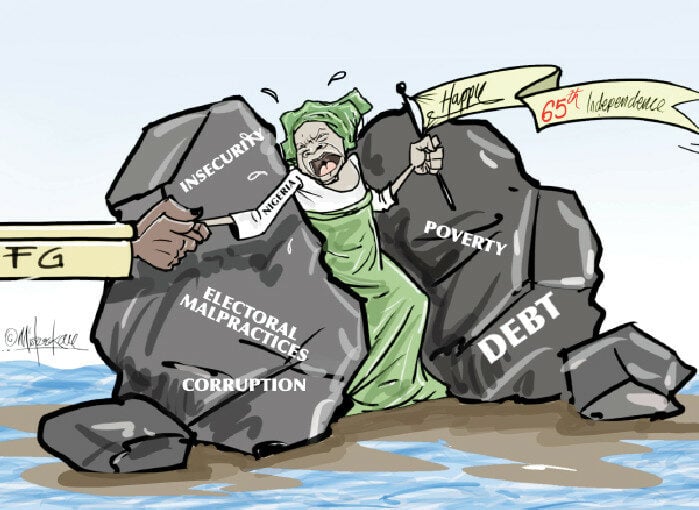Six and a half decades of political freedom have been a blend of sorts for Nigeria, whose independence on October 1 brought hope to a country emerging from the dungeon of British imperialism. Since Nigeria was set free from the chains of colonial Britain, the country has encountered both light and darkness.
Out of the 65 years of independence, it fought a fierce 30-month civil war that led to the death of many from both sides of the conflict.
Under the watch of the nation’s wartime benevolent military leader, General Yakubu Gowon (retired), measures to rehabilitate and reconcile estranged groups were achieved through Gowon’s “no victor, no vanquished” declaration.
Over 54 years after General Philip Effiong of the Biafran Army surrendered to Nigeria, issues that gave rise to the secession bid are still unresolved and unsettled, as the current struggle by the Indigenous People of Biafra (IPOB) to revive the past remains a never-ending fight that refuses to subside.
Passed Midnight
If Nigerians doubt President Bola Ahmed Tinubu’s declaration that the country has navigated the worst curve that kept it in perpetual darkness, the eight years of Muhammadu Buhari’s administration provide credence that Nigeria has finally left the Intensive Care Unit (ICU) of an unimpeded gradual descent into irrevocable self-destruction by a former military leader who failed to redeem his electoral promise of salvaging the country from the scourge of insurgency and banditry.
During the two years of the Tinubu-led administration, the fight against perpetrators of insecurity has been upgraded, and hundreds of terrorists and criminals have been decimated. Unlike in the past, when security forces waited to launch attacks on criminals, the Chief of Defence Staff, General Christopher Gwabin Musa, has ordered security personnel not to wait for such orders before confronting these brigands and criminals.
More than the past, which was characterized by ceaseless attacks and decimation of peace-loving communities by criminal groups, the present synergy among security agencies is now on the rise, with all security forces engaged in combating what some security experts describe as the last wave of insecurity in some parts of the country.
It is to the credit of the nation’s military that it has now taken the fight to the hideouts of these criminals, thus forcing them to be on the run and rendering them incapable of plotting their next dastardly moves.
It is in recognition of the military’s renewed firepower that bandits are now calling for negotiations with the promise to renounce violence against the state.
Aligned Vision
Much as the current administration has achieved certain milestones in turning the tables against past gloom, transforming promising data on the improvement of the economy into tangible benefits has become a huge burden.
Translating data of hope into alleviating the hardship of the populace is now the biggest challenge.
Despite the freeing of funds that have increased monthly allocations from the Federation Account for the states, some governors now indulge in profligacy and abdicate their mandate to improve the living standards of their citizens.
The promised upliftment of living standards has become a torturous journey to nowhere, while mismanagement of funds accruing from the federation account remains persistent, casting gloom over the renewed hope of salvaging impoverished citizens from deprivation.
Meeting the revenue target for 2025, as announced by the federal government last month, has provided another opportunity to channel additional income beyond the revenue threshold for the administration to improve living conditions for citizens in the remaining part of the year.
The foreign reserve of over $42 billion, compared to less than $22 billion in May 2023 when the administration took over, speaks volumes about the positive initiatives by the government to revamp the economy.
Against the tide of public opinion, the government has continued to pursue policies aimed at stabilizing the economy. However, despite the bright prospects of pulling the country out of economic difficulties, the opposition has seized on the current conditions and turned them into campaign issues for electoral purposes.
For hard-pressed citizens trapped in crippling suffering, the criticism by the opposition against Tinubu seems soothing. With the 2027 election cycle looming closer, the Tinubu-led administration must take urgent steps to alleviate the suffering of the masses and align its economic policies to address the pains of citizens.
While the necessity of current hardships remains undeniable following reforms to transform the country from a rentier state, the government should spare no effort in implementing urgent measures to provide relief for the mass of citizens whose lives are affected by the economic challenges.
Bobby Traps
Without doubt, President Tinubu has shown a resolute disposition in staying the course toward the resuscitation of the nation. To avoid a situation where progress is hindered, President Tinubu must move swiftly to resolve the present hunger crisis and realize future expectations.
With less than one and a half years to another election year, those plotting to wrest power from the incumbent administration are capitalizing on the current hardship plaguing citizens to advocate for regime change.
The call for electoral reforms, including the engagement of critical stakeholders in the appointment of the new INEC Chairman whose tenure will expire soon, is one of the issues President Tinubu must address in the coming weeks and months.
The commencement of the new tax regime, expected to start in January, is seen as an additional burden on citizens. Government is not a business but a system designed to balance the burden borne by the rich and the poor. The Tinubu government must find a creative way to tax the rich and provide relief to the poor.





